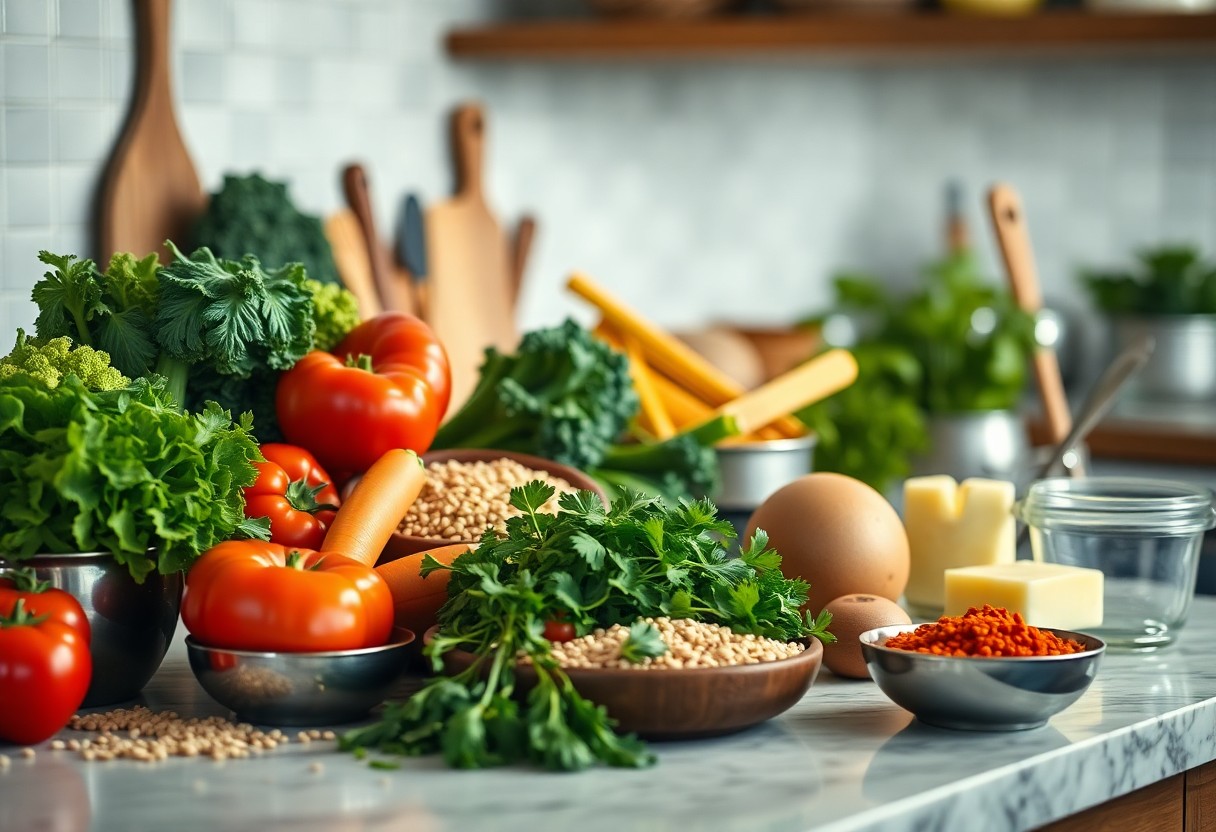Cooking For Health – Tips To Enhance Nutritional Value
10 Ways Smart Technology Transforms Everyday Life
April 25, 2025It’s important for you to understand how your cooking methods can significantly impact the nutritional value of your meals. By making simple adjustments in your cooking processes, you can maximize vitamins and minerals while minimizing unhealthy components. This post will provide you with valuable tips to enhance your food’s health benefits, ensuring that your meals are not only delicious but also nourishing. Embrace these strategies to take your cooking and overall well-being to the next level.
Key Takeaways:
- Incorporate Variety: Diversifying your ingredients can significantly boost the nutritional profile of your meals.
- Cook with Fresh Ingredients: Using fresh fruits and vegetables enhances flavor and offers higher nutrient content compared to processed options.
- Mind Cooking Methods: Opt for cooking techniques like steaming or grilling that preserve nutrients, rather than boiling or frying which can reduce them.
Understanding Nutritional Value
The nutritional value of food refers to the important nutrients it provides that are vital for maintaining your health and well-being. It encompasses macronutrients like carbohydrates, proteins, and fats, as well as micronutrients such as vitamins and minerals. By comprehending these elements, you can make informed decisions about your diet and ensure you are fueling your body effectively.
What is Nutritional Value?
Among the most significant aspects of food, nutritional value determines its role in supporting your body’s functions. It encompasses the proportions of macro and micronutrients present in the food, which collectively contribute to your overall health. Higher nutritional value means more beneficial components that aid in growth, energy, and disease prevention.
Importance of Nutritional Value in Cooking
Between taste and nutrition, understanding the nutritional value of your ingredients can transform your cooking practices. Focusing on high-nutrient foods enables you to prepare meals that not only satisfy your taste buds but also enhance your overall health. Cooking with a better grasp of nutritional value helps elevate your dishes while ensuring they provide necessary energy and important vitamins and minerals.
Understanding the importance of nutritional value in cooking allows you to create balanced meals that benefit your health rather than compromise it. Incorporating foods rich in nutrients will support your physical and mental well-being. This means prioritizing ingredients that boost your immunity, enhance your energy levels, and reduce the risk of chronic diseases. By focusing on these aspects, you not only improve your culinary skills but also empower yourself to make choices that contribute positively to your overall quality of life.
Choosing Quality Ingredients
Assuming you want to improve your cooking for health, selecting quality ingredients is imperative. Prioritizing ingredients that are fresh, organic, and locally sourced can significantly enhance the nutritional profile of your meals. Ingredients rich in vitamins, minerals, and antioxidants are key to creating dishes that nourish both body and mind. By understanding the source and quality of your ingredients, you can make informed choices that support your health goals.
Selecting Fresh Produce
Along your journey to healthier cooking, selecting fresh produce will make a noticeable difference in the taste and nutritional value of your dishes. Look for vibrant colors, firm textures, and seasonal options at your local farmer’s market or grocery store. Fresh fruits and vegetables are often packed with imperative nutrients and flavor, making them an excellent base for your meals.
Understanding Whole Foods vs. Processed Foods
Among the various options you encounter, understanding whole foods versus processed foods is imperative for maintaining a healthy diet. Whole foods—such as fruits, vegetables, whole grains, nuts, and seeds—are minimally altered and retain their natural nutrients. In contrast, processed foods often contain added sugars, unhealthy fats, and preservatives that can diminish your health. Choosing whole foods contributes to better overall nutrition and supports your body’s vital functions.
Understanding the difference between whole foods and processed foods can transform your eating habits. Whole foods provide you with nutrient-dense options that fuel your body effectively, while processed foods typically offer empty calories that can lead to unhealthy weight gain and other health issues. In particular, the high levels of sugar, sodium, and artificial ingredients present in processed foods can negatively impact your well-being. By opting for whole foods, you will benefit from increased fiber, antioxidants, and vital vitamins that support your health in the long run.
Cooking Methods that Enhance Nutrition
All cooking methods impact the nutritional value of your meals, and choosing the right one can make a significant difference. Techniques such as steaming, sautéing, and roasting not only improve flavor but also help retain the necessary vitamins and minerals in your ingredients. Opting for these methods over others like boiling can maximize the nutritional benefits while ensuring your meals are both delicious and healthful.
Steaming versus Boiling
At first glance, both steaming and boiling may seem like simple methods for cooking your vegetables; however, their impact on nutrition is significantly different. Steaming uses minimal water, allowing your food to retain more vitamins and minerals that can be lost during boiling. By choosing steaming, you preserve the color, flavor, and nutrients of your produce, making your meals not just healthier but also more vibrant.
Sautéing and Roasting for Flavor and Nutrients
Versus the straightforward approach of boiling, sautéing and roasting bring out incredible flavors while enhancing nutrient retention. These methods involve cooking with a small amount of healthy fats, which not only boosts the taste but also aids in the absorption of fat-soluble vitamins such as A, D, E, and K. Additionally, roasting at high temperatures can create a delightful caramelization effect, intensifying the natural sweetness of vegetables, while sautéing allows you to quickly cook vegetables, keeping them crisp and nutrient-dense.
To maximize the health benefits of sautéing and roasting, you should select high-quality oils such as olive or avocado oil, which contain healthy fats. Aim for a balance of vegetables, as different types provide a variety of nutrients that work synergistically in the body. You can also enhance flavor with spices and herbs, which not only add zest but also come with their own health benefits. Be mindful of the cooking time and temperature; overcooking can lead to nutrient loss. By carefully choosing these methods, you can create dishes that are both tasty and nourishing.

Incorporating Superfoods
After you’ve learned the basics of nutritious cooking, it’s time to boost your meals with superfoods. These ingredients pack a powerful punch of nutrients, antioxidants, and healthy fats, enhancing both the taste and health benefits of your diet. By incorporating these foods regularly, you can improve your overall well-being while enjoying delicious meals.
What are Superfoods?
The term “superfoods” refers to nutrient-rich foods that are especially beneficial for health and well-being. These foods are typically rich in vitamins, minerals, and antioxidants, which can help reduce the risk of chronic diseases, boost immunity, and promote better overall health. Some popular examples include blueberries, quinoa, kale, and chia seeds.
How to Add Superfoods to Your Meals
Meals can become healthier and more exciting when you incorporate superfoods into your cooking. Try adding them to smoothies, salads, or grain bowls for an easy nutrient boost. Integrating superfoods doesn’t require drastic changes; simple substitutions, like using avocado instead of mayonnaise or sprinkling chia seeds on yogurt, can make a significant difference in your nutritional intake.
Another great way to enhance your meals with superfoods is by experimenting with different combinations. You can blend spinach and kale into your morning smoothie, toss quinoa into salad for added texture, or sprinkle hemp seeds on your oatmeal. By incorporating these superfoods into every meal, you not only increase nutritional value but also enjoy greater diversity in your diet. The key is to be creative and find ways that work for your taste preferences and lifestyle.
Meal Planning for Balanced Nutrition
Despite the busy lives many lead, meal planning is necessary for achieving balanced nutrition. By organizing meals in advance, you can ensure a variety of nutrients are incorporated into your diet, helping to promote overall health. This proactive approach allows you to thoughtfully select ingredients, maintain portion sizes, and reduce the temptation to rely on unhealthy convenience foods.
Creating a Weekly Meal Plan
Plan your week by designing a meal schedule that includes a mix of proteins, whole grains, fruits, and vegetables. Consider themes for different days, making it easier to stay organized while enabling you to explore diverse cuisines. By sticking to a plan, you’ll not only streamline your grocery shopping but also minimize food waste and maximize your nutrition.
Portion Control and Nutrient Density
Plan to focus on portion control and nutrient density in your meals to enhance your health. Prioritize foods that deliver more nutrients with fewer calories, such as vegetables, legumes, and lean proteins. Balancing portions helps prevent overeating while ensuring that each meal is packed with vital vitamins and minerals, promoting better overall health.
In addition, practicing portion control ensures that you maintain a healthy balance in your meals. Aim to fill half your plate with non-starchy vegetables to enhance nutrient density. This strategy not only helps with weight management but also provides a wide array of necessary nutrients that support your health. By making informed choices about both portion sizes and nutrient-rich foods, you empower yourself to create meals that nourish your body effectively.
Flavoring for Health
Not all flavor comes from unhealthy sources; you can enhance your meals while boosting their nutritional value. By incorporating natural flavorings, you can create delicious dishes without relying on high-sodium or sugary options. Explore 8 tips for healthy eating that will elevate your cooking and nourish your body.
Herbs and Spices as Nutritional Boosters
Below are some potent herbs and spices that can elevate the nutritional quality of your meals. For instance, turmeric contains curcumin, a powerful anti-inflammatory compound, while garlic supports heart health. By experimenting with various herbs and spices, you can transform ordinary dishes into flavorful, nutrient-rich meals that benefit your overall health.
Reducing Sodium and Sugar in Recipes
Herbs and spices are crucial allies in your quest to reduce sodium and sugar in your recipes. Instead of reaching for that salt shaker or sugary condiment, try incorporating fresh herbs like basil, cilantro, or rosemary. These natural flavor enhancers add vibrant taste without the extra calories or unhealthy additives.
In fact, lowering your sodium and sugar intake is associated with significant health benefits. High sodium can lead to hypertension, while excessive sugar intake may result in diseases like diabetes and obesity. By substituting salt and sugar with herbs, spices, and other natural flavorings, you not only reduce these risks but also enjoy a more diverse and interesting diet. Make these simple changes today to promote your long-term health and wellness.
Summing up
From above, you can see that enhancing the nutritional value of your meals is integral to fostering better health. By incorporating whole foods, utilizing diverse cooking methods, and being mindful of portion sizes, you can significantly elevate the nutrient density of your diet. It’s necessary to prioritize fresh ingredients and flavor-enhancing techniques that preserve nutrients. By making these adjustments, you empower yourself to not only enjoy delicious meals but also support your overall well-being through optimal nutrition.
Q: What are some effective cooking methods to maximize the nutritional value of food?
A: To enhance the nutritional value of food, consider cooking methods that preserve vitamins and minerals. Steaming vegetables is an excellent choice as it reduces nutrient loss compared to boiling. Other methods include sautéing with healthy fats, such as olive oil, and using methods like roasting that require less water, helping to retain nutrients. Grilling can also lock in flavors and nutrients, making it a great option for meats and vegetables alike.
Q: How can I incorporate more whole foods into my cooking for better health?
A: Incorporating whole foods into your cooking can significantly improve your meal’s nutritional profile. Start by opting for whole grains, such as quinoa, brown rice, or whole wheat pasta instead of refined grains. Add a variety of colorful fruits and vegetables to your dishes, as they provide necessary vitamins, minerals, and antioxidants. Experiment with legumes, nuts, and seeds to enhance protein intake and create satisfying meals. Planning your meals around whole food ingredients can foster healthy eating habits.
Q: What role do herbs and spices play in enhancing the nutritional value of meals?
A: Herbs and spices are not only used for flavor but also offer various health benefits. Many herbs and spices are rich in antioxidants and possess anti-inflammatory properties. For instance, turmeric has curcumin, which is known for its anti-inflammatory effects, while garlic has been linked to heart health. Incorporating a variety of herbs and spices into your cooking can enhance the taste of your meals while contributing additional nutrients, making your dishes not only more enjoyable but more beneficial for your health.
NEWSLETTER






